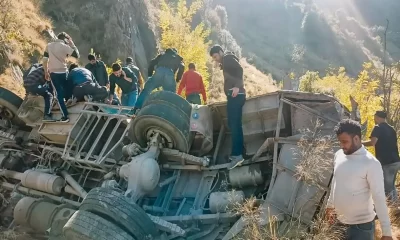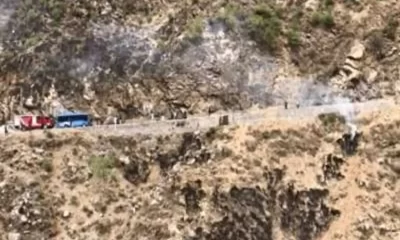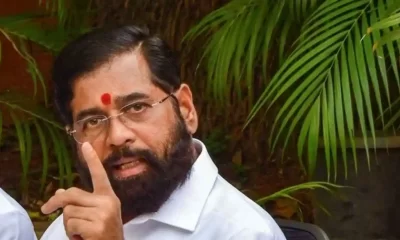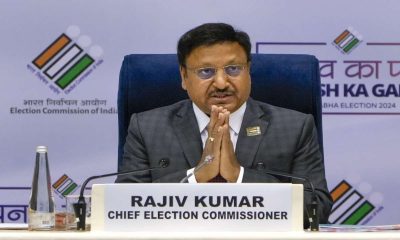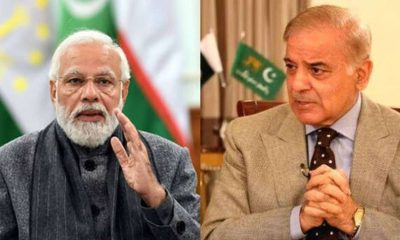Latest world news
India rejects UN report asking for inquiry into human rights violations in Kashmir
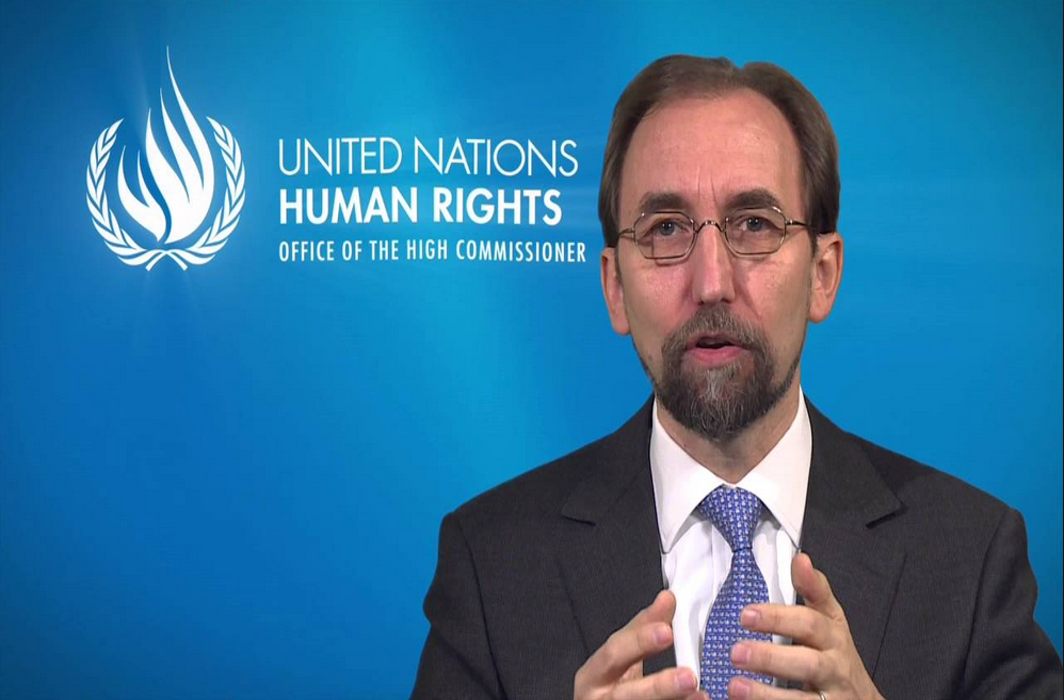
India on Thursday rejected the United Nations Human Rights Commission (UNHRC) report on ‘human rights situation in Kashmir’ calling it “fallacious, tendentious and motivated”.
Questioning the ” intent in bringing out such a report”, the Ministry of External Affairs (MEA) said in a statement that the report is a “selective compilation of largely unverified information. It is overtly prejudiced and seeks to build a false narrative.”
The UNHRC, in a first of its kind report on the alleged human rights violations, sought “establishment of a commission of inquiry to conduct a comprehensive independent international investigation into allegations of human rights violations in Kashmir” and asked the governments of India and Pakistan to “fully respect the right of self-determination of the people of Kashmir as protected under international law”.
The report also sought an international inquiry into these abuses, according to The Indian Express (IE). Asserting that there was an urgent need to address the past and ongoing human rights violations, the report said, “any resolution to the political situation in Kashmir should entail a commitment to ending the cycles of violence and accountability for past and current human rights violations.”
Adding that “people on both sides of the Line of Control have been detrimentally impacted and suffer from limitations or denial of a range of human rights,” the report also asked neighbouring country Pakistan to end its misuse of anti-terror legislation to quash dissent.
“Despite the Government of Pakistan’s assertions of denial of any support to these groups, experts believe that Pakistan’s military continues to support their operations across the Line of Control in Indian-Administered Kashmir,” said UNHRC.
The 49-page report titled “Report on the Situation of Human Rights in Kashmir: Developments in the Indian State of Jammu and Kashmir from June 2016 to April 2018, and General Human Rights Concerns in Azad Jammu and Kashmir and Gilgit-Baltistan” was submitted by the Office of the United Nations Commissioner for Human Rights before UN’s Human Rights council today, (Thursday, June 14).
In its statement, the MEA, said the report was a violation of India’s sovereignty and territorial integrity. It said, “The entire state of Jammu and Kashmir is an integral part of India. Pakistan is in illegal and forcible occupation of a part of the Indian state through aggression.”
The statement further said: ” Terrorism is the most egregious violation of human rights. Yet the authors have conveniently ignored the pattern of cross-border terrorism emanating from Pakistan and territories under its illegal control. Cross-border terror and incitement is aimed at suppressing the will of the people of Jammu and Kashmir, disrupting its political and social fabric and undermining India’s integrity.
It is disturbing that those behind this report have chosen to describe internationally designated and UN-proscribed terrorist entities as “armed groups” and terrorists as “leaders”. This undermines the UN led consensus on zero tolerance to terrorism.
The motivated report deliberately ignores that fundamental rights and freedoms guaranteed under the Constitution to every Indian citizen, including in the state of Jammu & Kashmir, are protected also by an independent judiciary, human rights commissions, free and vibrant media and an active civil society.”
The UNHRC said “the focus of the report is on the situation of human rights in the Indian state of Jammu and Kashmir from July 2016 to April 2018 over which period allegations of widespread and serious human rights violations were received, notably excessive use of force by Indian security forces that led to numerous civilian casualties.”
The report also talks about human rights violations in Pakistani Kashmir and Gilgit-Baltistan and asks Islamabad to “fully respect international human rights law obligations.”
“Shortly after the outbreak of violence (in July 2016), the High Commissioner for Human Rights met with the representatives of the Governments of Pakistan and India who had differing narratives about the ongoing events and the general situation in Kashmir,” said the UNHRC.
It says that “from July 2016, the High Commissioner for Human Rights has on numerous occasions requested the Governments of India and Pakistan that his Office be given unconditional access to Kashmir to assess the human rights situation. India rejected this request, while Pakistan offered access should the Office obtain access to Indian-Administered Kashmir.”
“Without unconditional access to Kashmir on either side of the Line of Control, the Office of the United Nations High Commissioner for Human Rights (OHCHR) has undertaken remote monitoring of the human rights situation. This first report on the situation of human rights in both Indian-Administered Kashmir and Pakistan-Administered Kashmir is based on such monitoring,” says the report.
Here are the findings of this UNHRC report (from IE):
ON INDIA
*“In responding to demonstrations that started in July 2016, Indian security forces used excessive force that led to unlawful killings and a very high number of injuries”.
*”One of most dangerous weapons used against protesters during the unrest in 2016 was the pellet-firing shotgun, which is a 12-gauge pump-action shotgun that fires metal pellets”.
*”In the same context, since the late 1980s, a variety of armed groups has been actively operating in the Indian state of Jammu and Kashmir, and there has been documented evidence of these groups committing a wide range of human rights abuses, including kidnappings and killings of civilians and sexual violence. The landscape of armed intervention by groups operating in Indian-Administered Kashmir has shifted over the years. In the 1990s, around a dozen significant armed groups were operating in the region; currently, less than half that number remain active. Despite the Government of Pakistan’s assertions of denial of any support to these groups, experts believe that Pakistan’s military continues to support their operations across the Line of Control in Indian-Administered Kashmir”.
* “Impunity for human rights violations and lack of access to justice are key human rights challenges in the Indian state of Jammu and Kashmir. Special laws in force in the state, such as the Armed Forces (Jammu and Kashmir) Special Powers Act, 1990 (AFSPA) and the Jammu and Kashmir Public Safety Act, 1978 (PSA), have created structures that obstruct the normal course of law, impede accountability and jeopardize the right to remedy for victims of human rights violations”.
*“Over 1,000 people were detained under the PSA between March 2016 and August 2017. Human rights groups had warned Jammu and Kashmir authorities that minors were being arrested under the PSA in 2016 and 2017”.
*”During the 2016 unrest, there were numerous reports of attacks on, and obstruction of, basic medical services that had a severe impact on the injured and general civilian population in Kashmir. ……days-long curfews and communications blockades also had a major impact on people and their access to medical care in Kashmir”.
*”The Kashmir region experienced frequent communications blockades during the 2016 unrest as the state Government suspended mobile and internet services on multiple occasions. In 2016, the authorities in Jammu and Kashmir imposed restrictions on freedom of expression, targeting media and journalists”.
*”Widespread protests, long periods of curfew and frequent strikes in 2016 and 2017 had a cumulative impact on students and their right to education”.
*”Impunity for enforced or involuntary disappearances in Kashmir continues as there has been little movement towards credibly investigating complaints including into alleged sites of mass graves in the Kashmir Valley and Jammu region”.
*”Authorities have failed to independently investigate and prosecute allegations of sexual violence by security forces personnel”.
ON PAKISTAN:
*“While the main focus of the report is on the situation of human rights in the Indian state of Jammu and Kashmir from July 2016 to April 2018, the report examines the situation in Pakistan-Administered Kashmir within that timeframe. However, the human rights violations in this area are of a different calibre or magnitude and of a more structural nature”.
*”Pakistan’s prime minister, the federal minister for Kashmir Affairs and Gilgit-Baltistan and the federal civil service have full control over all government operations in both Azad Jammu and Kashmir (AJK) and Gilgit-Baltistan (G-B). According to an international NGO, federal intelligence agencies are deployed across the two regions and have “considerable powers over local elected representatives and officials”. Given such a constitutional relationship with Pakistan, residents of AJK and G-B do not enjoy all the rights and protections available to those under the Pakistan Constitution”.
*”The interim constitution of AJK has placed several restrictions on anyone criticizing AJK’s accession to Pakistan, in contravention to international standards on the rights to freedoms of expression and opinion, assembly and association”.
*”A national NGO found that “hundreds of individuals” had been imprisoned under the Pakistan’s Anti-Terrorism Act, 1997 in G-B, and it was being used to target locals who have been raising issues related to the “rights of the people”.
*”A national NGO was informed that G-B authorities had forcibly evicted locals in Maqpoon Das area, while the Chief Secretary of G-B had allocated the same land to state authorities for the China Pakistan Economic Corridor.
*”Similar to the Constitution of Pakistan, AJK’s Interim Constitution also defines who may be considered to be a Muslim. This definition is used to declare members of the Ahmadiyya community as non-Muslims and is the basis of institutional discrimination against them”.
OTHER ISSUES
*”According to figures provided by the Governments of India and Pakistan, ceasefire violations have been increasing between 2016 and April 2018. Increasing civilian casualties and injuries and a large number of people being displaced appear to be the consequence.
- OHCHR (Office of the UN High Commissioner for Human Rights) recognizes the complexity of the historical background and political issues that has led to the current situation in Kashmir, which has been divided between India and Pakistan. People on both sides of the Line of Control have been detrimentally impacted and suffer from limitations or denial of a range of human rights”.
*”There remains an urgent need to address past and ongoing human rights violations and to deliver justice for all people in Kashmir who have been suffering seven decades of conflict. Any resolution to the political situation in Kashmir should entail a commitment to ending the cycles of violence and accountability for past and current human rights violations and abuses committed by all parties and redress for victims. Such a resolution can only be brought about by meaningful dialogue that includes the people of Kashmir”.
Based on its findings, the UNHRC report has sought the “establishment of a commission of inquiry to conduct a comprehensive independent international investigation into allegations of human rights violations in Kashmir”. The UNHRC report has also made specific recommendations to New Delhi and Islamabad.
Key Recommendations to New Delhi:
*”Urgently repeal the Armed Forces (Jammu and Kashmir) Special Powers Act, 1990; and, in the meantime, immediately remove the requirement for prior central government permission to prosecute security forces personnel accused of human rights violations in civilian courts”
*”Establish independent, impartial and credible investigations to probe all civilian killings which have occurred since July 2016, as well as obstruction of medical services during the 2016 unrest, arson attacks against schools and incidents of excessive use of force by security forces including serious injuries caused by the use of the pellet-firing shotguns”.
*”Investigate all deaths that have occurred in the context of security operations in Jammu and Kashmir following the guidelines laid down by the Supreme Court of India”.
*”Investigate all cases of abuses committed by armed groups in Jammu and Kashmir, including the killings of minority Kashmiri Hindus since the late 1980s”.
*”Provide reparations and rehabilitation to all individuals injured and the family of those killed in the context of security operations”.
*”Investigate and prosecute all cases of sexual violence allegedly perpetrated by state and non-state actors, and provide reparations to victims”.
*”Bring into compliance with international human rights standards all Indian laws and standard operating procedures relating to the use of force by law enforcement and security entities, particularly the use of firearms: immediately order the end of the use of pellet-firing shotguns in Jammu and Kashmir for the purpose of crowd control”.
*”Amend the Jammu and Kashmir Public Safety Act, 1978 to ensure its compliance with international human rights law”.
*”Release or, if appropriate, charge under applicable criminal offences all those held under administrative detention and ensure the full respect of standards of due process and fair trial guaranteed under International law”.
*”Treat any person below the age of 18 who is arrested in a manner consistent with the Convention on the Rights of the Child”.
*”Investigate all blanket bans or restrictions on access to the Internet and mobile telephone networks that were imposed in 2016, and ensure that such restrictions are not imposed in the future”.
*”End restrictions on the movement of journalists and arbitrary bans of the publication of newspapers in Jammu and Kashmir”.
*”Ensure independent, impartial and credible investigations into all unmarked graves in the state of Jammu and Kashmir as directed by the State Human Rights Commission; if necessary, seek assistance from the Government of India and /or the international community.
*”Expand the competence of the Jammu and Kashmir State Human Rights Commission to investigate all human rights violations and abuses in the state, including those allegedly committed by central security forces”.
*”Ratify the International Convention for the Protection of all Persons from Enforced Disappearance, the Convention against Torture and Other Cruel, Inhuman or Degrading Treatment or Punishment and its Optional Protocol, and introduce enabling domestic laws as recommended during India’s UPR in 2008, 2012 and 2017”.
*” Fully respect the right of self-determination of the people of Kashmir as protected under international law”.
Key recommendations to Islamabad:
*“Fully respect international human rights law obligations in Pakistan-Administered Kashmir”.
*”End the misuse of anti-terror legislation to persecute those engaging in peaceful political and civil activities and expressions of dissent, and amend the Anti-Terrorism Act to bring it in line with international human rights standards, including by incorporating human rights safeguards”.
*”Federal and local authorities should amend sections of the Interim Constitution of Azad Jammu Kashmir and other relevant legislation that limit the rights to freedoms of expression and opinion, and peaceful assembly and association”.
*”Immediately release from prison or house arrest any political activists, journalists and other civil society actors who have been convicted for peacefully expressing their opinions”.
*”Federal and local authorities should amend the constitutions of Azad Jammu and Kashmir and Gilgit-Baltistan to end the criminalization of the Ahmadiyya Muslims and to allow to them to freely and safely exercise their freedom of religion or belief”.
*”Abolish blasphemy provisions in Azad Jammu Kashmir and Gilgit-Baltistan to facilitate the enjoyment of freedom of religion and belief by all people”.
*”Fully respect the right of self-determination of the people of Kashmir as protected under international law”.
Latest world news
World Earth Day 2024: Google Doodle showcases aerial view of planet’s natural beauty
Google celebrated Earth Day 2024 with a special doodle featuring an aerial view of our planet’s biodiversity.
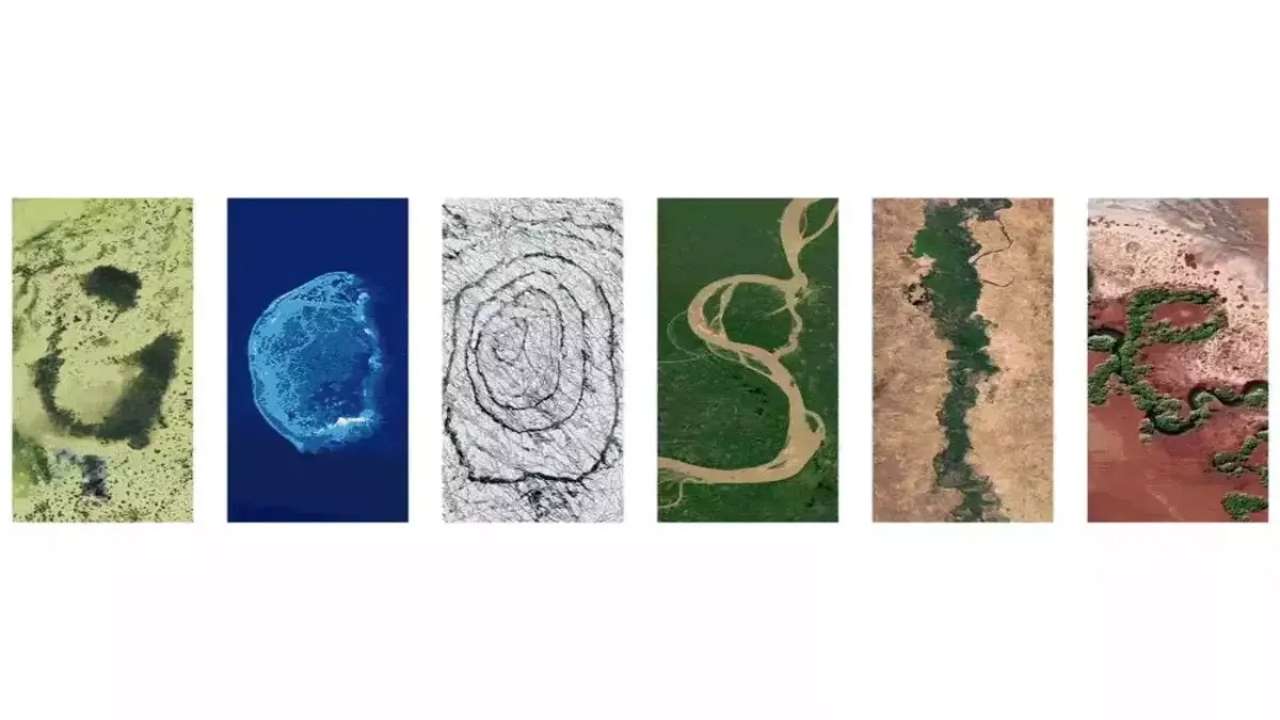
Google shared a doodle today to celebrate World Earth Day 2024, which showcased aerial photos of the planet’s biodiversity and natural beauty. Google reminded us of the importance of protecting planet earth for future generations with the help of this doodle.
The Google letters depict specific locations across the globe where people, communities, and governments work every day to help protect the planet’s natural beauty, biodiversity, and resources, according to the explanation of the annual Earth Day 2024 doodle on their website.
It said, these examples remind us that there’s much more to do to address the climate crisis and biodiversity loss, but also offer the promise of hope and optimism.
The islands of Turks and Caicos are represented by the letter “G.” The islands’ conservation efforts are concentrated on protecting important regions for biodiversity and addressing persistent environmental problems.
The largest reef in the southern Gulf of Mexico and a UNESCO biosphere reserve, Scorpion Reef National Park, is represented by the letter “O” in the Mexican flag.
The letter “O” features Iceland’s Vatnajokull National Park, which was designated as a national park in 2008 following decades of advocacy. The ecology within and surrounding the biggest glacier in Europe is safeguarded by this UNESCO World Heritage Site.
The letter “G” has the Jau National Park in Brazil on it. It is a UNESCO World Heritage Site and one of the biggest forest reserves in South America.
The Great Green Wall of Nigeria is represented by the letter “L,” and the Pilbara Islands Nature Reserves of Australia are represented by the letter “E.”
Meanwhile, Earth Day is a worldwide event that promotes protection of the environment every year. April 22 serves as a reminder of the importance of conservation efforts and sustainable practices to guarantee a healthier world and a brighter future.
The occasion inspires people across the world to come together and take action to protect the environment, strengthening our bonds with nature and promoting good change.
Latest world news
Bigg Boss 14 contestant Rahul Vaidya struggles walking in knee deep water, compares Dubai rains with Mumbai floods
Singer and TV personality Rahul Vaidya was recently stranded in the Dubai rains.

Rahul Vaidya, who was in Dubai ahead of his show which was scheduled to take place today, left the country due to heavy rains and reached Kolkata. The artist shared on social media his encounters in the UAE city, including challenges like walking through knee-deep water. Rahul provided an update regarding the heavy rainfall in Dubai on his Instagram profile.
The Bigg Boss 14 contestant revealed that he was in Kolkata and prepared to do an evening performance. Recalling the terrifying period he went through, Vaidya said there was a lot of confusion and panic in Dubai. The situation was similar to that when heavy floods hit Mumbai in 2005.
Vaiday also posted seval other images and videos of cars that were underwater and flooded roadways. The Bigg Boss 14 contestant, who shared his ordeal, claimed that even though it had just rained for two hours, the situation was dire.
In one of the video, which went viral he can be seen struggling in walking in knee-deep water. He can be also seen holding his sneakers in one hand and with other hand he was seen managing other things.
This is the result of the two hours of rain that it had, he can be heard saying in the video. Vidya also said he dosen’t believe Dubai is accustomed to a lot of rain. Everything had stopped working, he remarked.
After taking part in the first season of the singing reality show Indian Idol, Rahul Vaidya gained widespread recognition. In addition to Bigg Boss, he took part in Khatron Ke Khiladi 11.
Meanwhile, heavy rains that triggered flooding in the UAE and Bahrain, which left 18 people dead in Oman on Sunday and Monday, have paralyzed the financial hub of the Middle East, Dubai.
A lot of incoming flights were diverted from Dubai’s international airport because of the rain. At 7:26 p.m., the busiest airport in the world for foreign visitors stopped accepting new arrivals; a gradual resumption was announced for more than two hours later.
Images of planes navigating flooded tarmacs are making the rounds on social media.
According to pictures shared on social media, the flagship malls Dubai Mall and Mall of the Emirates both experienced heavy floods, while at least one Dubai Metro station had water up to the ankles.
There were several road collapses, severe flooding in residential areas, and numerous reports of leaks from windows, doors, and roofs.
Due to the unfavourable weather, schools around the United Arab Emirates were forced to close, and as more storms are predicted, the closures are anticipated to last until Wednesday. The government of Dubai allowed its staff to work remotely till this Wednesday.
Latest world news
Dubai sky turns green during storm in UAE, video goes viral
The UAE witnessed record-breaking rainfall on Tuesday and the National Centre of Meteorology recorded 254 mm of rainfall in less than 24 hrs in the Khatm Al Shakla area in Al Ain.

1 person was killed in UAE as it witnessed heavy rainfall on Tuesday, stranding commuters, flooding roads, disrupting trains and flights and resulting in water leakage from mall ceilings. The UAE witnessed record-breaking rainfall on Tuesday and the National Centre of Meteorology recorded 254 mm of rainfall in less than 24 hrs in the Khatm Al Shakla area in Al Ain. It is being said that the rainfall was the highest documented since the start of data collection in 1949.
The heavy rainfall in UAE came days after a similar situation in neighbouring Oman, where 13 people were killed in flash floods. Many parts of Oman saw torrential rains, which caused students to be trapped in buses and swept away motorists and trapped people in their homes.
Videos from Dubai circulating on social media showed widespread waterlogging on roads in Abu Dhabi, Dubai and other important cities. This left daily commuters in cars and other vehicles struggling to get back home. Dubai metro station too was seen flooded and closed.
One such video circulating on social media shows the aerial view of the city of Dubai from the top of a building. In the video the stormy winds are seen blowing over the city of Dubai. As the storm intensifies the Dubai sky turns green and ultimately gets covered by heavy rainfall. The video has gone viral on social media with more than 1.1 million views.
Another video showed water leakage from the ceilings of shopping malls, flooding the floors and destroying goods. A video which was shot in the famous Mall of the Emirates, showed pieces of ceiling falling as the rainwater gushed inside. Videos from many outlets of the Deira City Centre mall chain showed escalators being rendered unusable. Majid Al Futtaim, the company which owns the Mall of Emirates, said that the shopping complexes have been kept open and the customers are being sent away from the flooded areas.
-

 Entertainment13 hours ago
Entertainment13 hours agoOn wife Anushka Sharma’s birthday, Virat Kohli says he would’ve been lost without her
-

 Entertainment13 hours ago
Entertainment13 hours agoPushpa Pushpa: Allu Arjun starrer Pushpa 2 first song released
-
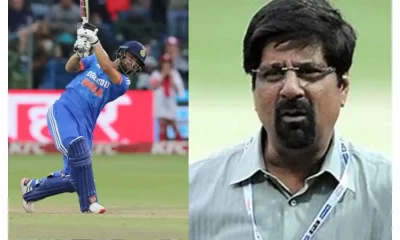
 Cricket news18 hours ago
Cricket news18 hours agoK Srikkanth slams Rinku Singh’s exclusion from T20 World Cup squad, says Rinku Singh has been made a scapegoat
-

 Cricket news20 hours ago
Cricket news20 hours agoIPL 2024: Marcus Stoinis scores half century to help Lucknow Super Giants beat Mumbai Indians by 4 wickets
-

 Entertainment18 hours ago
Entertainment18 hours agoKatrina Kaif deepfake video goes viral, social media says it is getting scary
-
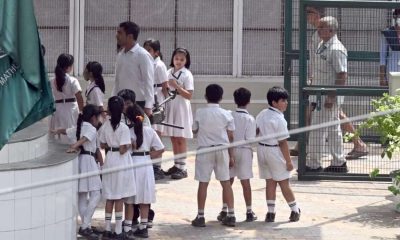
 India News20 hours ago
India News20 hours agoDPS Dwarka, Amity, several other Delhi-NCR schools get bomb threat, Central agencies launch probe
-
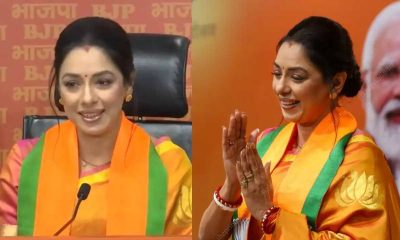
 2024 Lok Sabha Elections17 hours ago
2024 Lok Sabha Elections17 hours agoLok Sabha elections 2024: Anupamaa actor Rupali Ganguly joins BJP, says she feels she should also be a part of this Mahayagya
-

 2024 Lok Sabha Elections16 hours ago
2024 Lok Sabha Elections16 hours agoPriyanka Gandhi says PM Modi is far away from reality of common people, calls him an egoistic person



